New KFF Survey Report Provides State-Level Data on Medicaid Financial Eligibility for Seniors and People with Disabilities
A new KFF issue brief presents state-level data and tables on Medicaid financial eligibility criteria and adoption of the major coverage pathways related to old age and disability as of 2018.
The 50-state survey that serves as the basis of the brief finds that the income limits associated with the age and disability-related pathways to Medicaid eligibility vary across states but generally remain low. The median income limit was 74 percent of the federal poverty level (or $771/month) for individuals eligible based on old age or disability, 48 percent of poverty ($500/month) for individuals eligible as medically needy, and 250 percent ($2,602/month) for working people with disabilities.

The analysis also finds that greater shares of states that have adopted the Affordable Care Act’s Medicaid expansion also have adopted key optional age and disability-related pathways to expand coverage for these populations, compared to non-expansion states.
Medicaid is a key source of health and long-term care coverage for about seven million seniors, as well as seven million nonelderly adults with disabilities and 6 million children with special health care needs.

Filling the need for trusted information on national health issues, the Kaiser Family Foundation is a nonprofit organization based in San Francisco, California.
